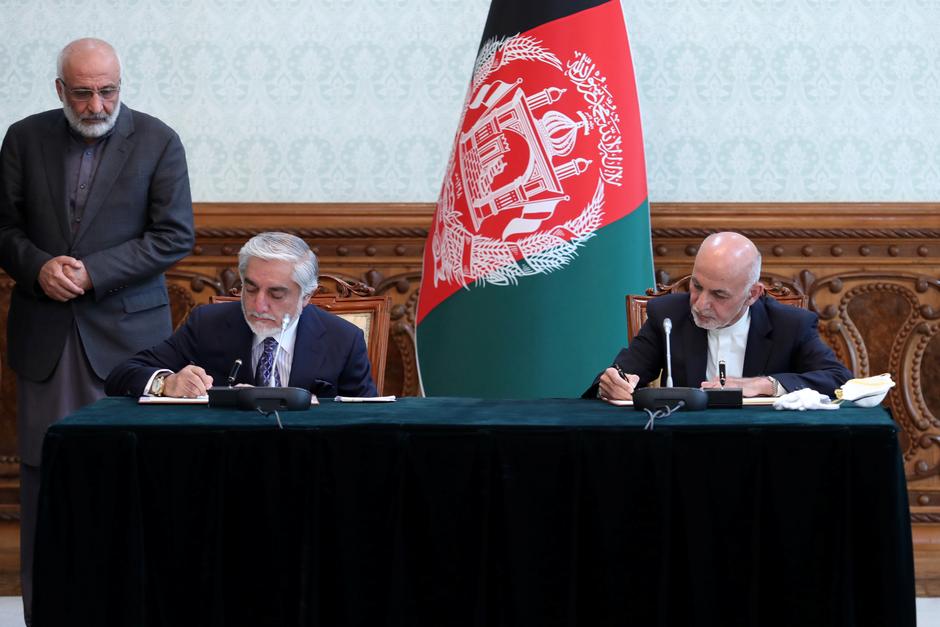Afghanistan peace process at a crossroads
https://arab.news/cgfe6

Friday marks three months since the agreement between the US and the Taliban was signed in Doha with the aim of bringing peace to conflict-ridden Afghanistan. But, since then, there have been few signs that the country’s fault lines are being repaired.
Perhaps the root cause is the agreement itself. For the Americans, the title of the agreement is “Agreement for Bringing Peace to Afghanistan,” while the Taliban describe it as the “Termination of Occupation Agreement,” reflecting the different priorities of the two principal players.
The immediate US interest is to withdraw most, if not all, of its 12,000 troops from Afghanistan, where they have fought with little success and even less glory since 2001. The Taliban are anxious to expedite the US departure so that they can retake control of their country and shape it in terms of their vision and beliefs system.
The US anxiety to leave has meant that the agreement is generally accommodative of the Taliban’s agenda, including the withdrawal of all US and allied forces by July 2021. In return, the Taliban have promised not to attack the US or its allies and not allow Afghan territory to be used by terrorists (i.e., Al-Qaeda and Daesh).
Surprisingly, the agreement does not call for the dismantling of the Taliban’s support infrastructure in Pakistan, nor does it ask the Taliban to sever their long-standing ties with militias in Pakistan.
Above all, the agreement does not ask the Taliban to desist from fighting against Afghan security forces or hitting Afghan civilian targets. Attacks believed to have been carried out by the Taliban on May 12 left more than 50 dead and compelled government forces to move into offensive mode.
The Doha agreement had called for an intra-Afghan dialogue between the Taliban and the government in Kabul from March 10, to be preceded by goodwill gestures — the government releasing 5,000 Taliban prisoners and the Taliban reciprocating with the release of 1,000 in their custody. This process only began this week with the government’s release of 900 Taliban detainees.
Some positive developments have occurred in May. The impasse relating to the presidential elections following the declaration of the results in February ended with a power-sharing agreement between incumbent President Ashraf Ghani and his rival, Abdullah Abdullah. The latter relinquished his claim to the presidency and took over as chairman of the High Council for National Reconciliation, thus leading the dialogue with the Taliban. And a cease-fire was announced for Eid.
With US forces set to depart, other regional players have emerged on the Afghanistan scene — Iran, Russia and China. They have been brought together by concerns that a weak and conflictual Afghanistan would again become a bastion for extremist forces that could destabilize the region. All of them have been regularly interacting with the Taliban leadership and are promoting the peace process.
They are joined by a fourth player — Pakistan. Amid the volatile Afghan scenario, Pakistan is concerned about an increased Indian role in the country. So far, India has remained hostile to the Taliban and has worked closely with successive governments in Kabul, while investing more than $3 billion in development and welfare projects. It has received signals from the US and sections of the Taliban to engage with the latter. But India has decided to adopt a cautious approach.
This caution makes sense. A major source of uncertainty relating to the Taliban’s intentions is the fact they are not a monolithic entity. While several of their leaders and fighters are war-weary and eager for political accommodation, the Taliban have their hard-liners, including the Sare Qeta (Red Brigade), which is an elite fighting force that is well-armed and trained.
With their reduced violence and cooperation with international health agencies, the Taliban have indicated they could be responsible partners in a future Afghan order.
Talmiz Ahmad
Recent reports from Afghanistan suggest that the Taliban remain uncomfortable with the Western-style democratic order the country has adopted, which they see as a foreign imposition.
Other observers believe that the Taliban have reinvented themselves and are now more moderate and reasonable, and credible participants in the peace process. They also point out that a US military presence, albeit reduced, will continue and will ensure that the Taliban do not return to their obscurantist and aggressive ways. With their reduced violence during the ongoing pandemic and their cooperation with international health agencies, the Taliban have indicated they could be responsible partners in a future Afghan order.
Afghanistan is on the cusp of a historic dialogue that will determine whether it witnesses genuine reconciliation or continues on the path of intolerance, as parties with different worldviews and interests seek to control the destiny of their nation.
- Talmiz Ahmad is an author and former Indian ambassador to Saudi Arabia, Oman and the UAE. He holds the Ram Sathe Chair for International Studies at the Symbiosis International University in Pune.










































